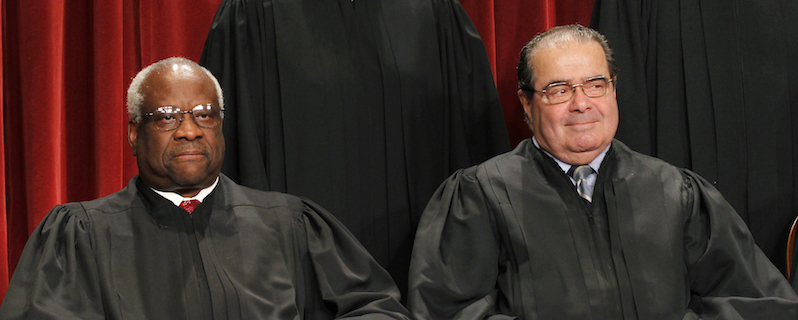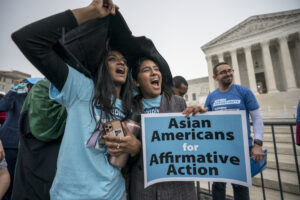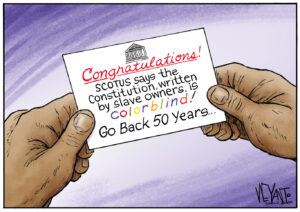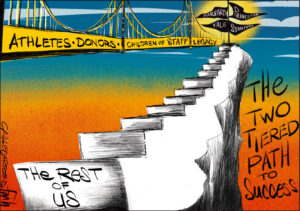The 2015 SCOTUS Awards: A Look Back at the Highs, Lows and Yearly Shenanigans of the Supreme Court
Justice Antonin Scalia earned his stripes as the court’s loosest cannon for his remarks on Obamacare and same-sex marriage, while Justice Clarence Thomas was honored for making it through his ninth year without asking a single question during oral arguments. Supreme Court Justices Clarence Thomas and Antonin Scalia in Washington in 2010. (Pablo Martinez Monsivais / AP)
1
2
3
4
5
Supreme Court Justices Clarence Thomas and Antonin Scalia in Washington in 2010. (Pablo Martinez Monsivais / AP)
1
2
3
4
5
In Rodriguez v. United States, in a 6-3 vote, she invalidated a search and seizure conducted during a traffic stop, holding that absent reasonable suspicion, police extension of a stop to have a dog sniff for drugs violates the Constitution’s shield against unreasonable seizures. She even cajoled Scalia into supporting her opinion. Justices Kennedy, Alito and Thomas cast contrary ballots.
In Arizona State Legislature v. Arizona Independent Redistricting Commission, an important redistricting case, Ginsburg upheld Arizona’s use of a bipartisan independent commission to adopt and design congressional districts. The justices split their votes in the appeal 5-4 along strict party lines.
Here’s hoping she keeps taking her vitamins or whatever it is that sustains her.
SUPPORT TRUTHDIG
A Big Megaphone for Judging in the Real World
Without hesitation, first place goes to Justice Sonia Sotomayor. She’s also a repeat winner in this category. Unlike any other member of the court, Sotomayor appreciates what it means to grow up and come of age in the United States as a poor, working-class minority woman. In 2014, in response to the majority’s 6-2 holding in Schuette v. Coalition to Defend Affirmative Action that it was constitutionally permissible for Michigan voters to ban affirmative action, Sotomayor penned a masterful dissent. In it, she schooled the majority (including Thomas) on the racial realities of contemporary America, reminding her fellow justices that “race matters,” not only because of persistent inequality but “for reasons that really are only skin deep, that cannot be discussed any other way, and that cannot be wished away.” In this year’s oral arguments on affirmative action in Fisher, Sotomayor continued apace, expressing exasperation with the petitioner’s attacks on the “holistic” admissions program used by the University of Texas. If UT’s system, which allows it to consider an undergraduate applicant’s race, together with myriad other personal factors, does not pass constitutional muster, she wondered aloud whether “any holistic review [could] ever survive.” On those occasions when she found herself in the majority in 2015, Sotomayor also managed to distinguish herself. Among her seven majority opinions, she overturned on Fourth Amendment grounds a Los Angeles city ordinance (City of Los Angeles v. Patel) that had authorized police to force motel owners to turn over guest register information without a warrant and without according the owners an opportunity to contest threatened inspections in front of “a neutral decision maker,” such as an administrative law judge. The vote — you guessed it — was 5-4, the Democrats plus Kennedy versus the rest of the gang.A Nice Warm Pair of Socks for Being the New Kid in Chambers
The honor falls to Justice Elena Kagan, the court’s most junior member, appointed in August 2010, and the only current justice with no previous judicial experience before joining the court. Under the Supreme Court’s procedures, the chief justice, or the most senior member in the majority if the chief is in the dissent, assigns a justice in the majority to write the opinion of the court. For the court’s junior panelist, the process often means that he or she gets the legal equivalent of table scraps, designated to write few, if any, blockbuster opinions. Through no fault of her own then, 2015 proved to be a somewhat lackluster year for Kagan, who produced a court low of 11 signed opinions — seven for the majority, two concurrences and two dissents. Her most impressive effort was a 5-4 ruling — United States v. Wong — that liberalized the deadlines for filing lawsuits against the federal government under the Tort Claims Act. Better fortune next year, Elena. In the meantime, stay cozy this winter with your new footwear. No doubt, your output and input will improve over time. So there you have them, our 2015 SCOTUS awards. If you thought this year’s ride was raucous and bumptious, wait until next December, when we will hand out a whole new shelf’s worth of plaques, medals, trinkets and ornaments in the wake of the 2016 presidential elections. That is, if President-elect Trump keeps the Internet open. So stay tuned … if you can. Your support matters…Independent journalism is under threat and overshadowed by heavily funded mainstream media.
You can help level the playing field. Become a member.
Your tax-deductible contribution keeps us digging beneath the headlines to give you thought-provoking, investigative reporting and analysis that unearths what's really happening- without compromise.
Give today to support our courageous, independent journalists.






You need to be a supporter to comment.
There are currently no responses to this article.
Be the first to respond.